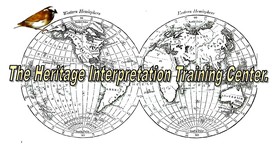John Veverka & Associates
Main menu
- Home Page
- Our Range of Services
- Separator 2
- Interpretive Coaching
- Interpretive Planning
- Interpretive Plan Outline
- Interpretive Training
- John Veverka Resume
- Qualifications
- NEW Advanced Interp. Text Book
- Separator 11
- InterpNEWS
- Separator 12
- Library
- Expert in Interpretation
- JVA NEWS, Courses and Updates
- Certificates
- Separator 47
- Planning/Design of Interpretive Panels
- Separator 48
- Interpretive Writing
- Separator 49
- Interpretive Writing Course
- Separator 50
- Interpretive Trails Course
- Separator 56
- Interpretive Panels Course
- Separator 55
- Introduction to Heritage Interpretation Course
- Separator 54
- Interpretive Planning & Design of Marketing Brochures Course
- Training for Interp. Trainers
- Separator 57
- Interpretive Exhibits Course
- Separator 58
- Interpretive Master Planning Course
- Separator 59
- Interpretive Planning for Scenic Byways.
- Critiquing and Coaching Interpretive Staff
- Separator 31
- Advanced Interpretive Planning
- Interpretive Training Center Course Catalogue
- Separator 32
- Interp. for International Visitors course.
- Separator 33
- Interpretive Exhibits Evaluation
- Separator 34
- Interp. Center Feasibility Analysis Course.
- Separator 35
- Interp. for Commercial Tour Providers
- Separator 36
- Interpretive Researchers Guide for Visitor Studies
- Separator 37
- Separator 13
- Interp. Planning for Historic Homes
- Separator 14
- Heritage Interpretation Training Center
- Interpretive Planning for Botanical Gardens
- Separator 15
- An introduction to planning and presenting live interpretive programs and tours for Museum/Heritage Site Docents and Volunteers.
- Developing Marketing Plans for Heritage & Tourism Sites and Attractions
- Separator 16
- Interpretation Book Store
- Separator 17
- Heritage Interpretation Resource Center
- Interpretive Planning for Historic Farms
- Developing Successful Partnerships
- Developing Interpretive Outreach Programs
- Community Interpretation Planning
- Interpreting Gravestones and Historic Cemeteries
- Using Interpretation to Accomplish Management Objectives.
- An Interpreters Guide for Survival Economics.
- Separator 18
- Innovative Strategies for Interpretive Media and Services Planning.
- Separator 19
- A Curators Guide for Developing Gallery Tours.
- Advanced Interpretive Writing - Technical Publications
- Page 2
- Advanced Interpretive Services for Managers, Supervisors, Team Leaders and Sr. Staff.
- Separator 20
- Advanced Interpretation for Chiefs of Interp. - Interpretive Managers - Regional Interp. Specialists
- Interpreting Critical Issues.
- Separator 21
- Developing Commercial Interpretation for Resorts, Cruise Ships, Campgrounds and Tourism Attractions.
- Separator 38
- Planning and developing a new commercial tour guiding business.
- Separator 39
- Interpretive Evaluation, Visitor Studies and Site Assessment Center
- Separator 40
- The Center for Interpretive Planning Advancement & Excellence.
- Developing Requests for Proposals (RFPs)
- Separator 41
- Planning and Facilitating Focus Workshops
- Separator 42
- InterpNEWS Advertising Details
- Planning for Interpretive Experiences
- 40 Years a Heritage Interpreter
- Separator 43
- Interpretive Techniques - The Rest of the Story Course
- Separator 44
- Certified Professional Interpretive Planner Certificate
- Certified Professional Interpretive Program
- Certified Professional Interpretive Trainer certificate program.
- Separator 53
- Certified Professional Heritage Interpreter certificate program.
- Separator 52
- Certified Professional Interpretive Writer certificate program.
- Visitor motives for attending interpretive programs.
- Separator 45
- Exhibit Rehab Course
- Separator 46
- Developing Training Workbooks & Manuals
- Separator 22
- Planning for Railroad Museums and Sites.
- Separator 51
- Climate Change Interpretation Course.
- Separator 23
- When there's nothing left but the story - interp. storytelling.
- Separator 24
- Interpreting Legends Myths and Fables
- Separator 25
- InterpSHARE - Seminars 2022
- Separator 26
- Interpreting Invasive Species
- Separator 27
- Interpretiing Edible Insects
- Separator 28
- Interpretaive Planning for Climate Change
- Separator 29
- HITC Climate Crisis Resource Center
- Separator 30
- Separator 5
- PUP Members Only
- Starting a new Interp Consulting Business
- Panels 4 Week Course
- Separator 8
- Interpretive Writing - 4 Week Course
- Marketing - 4 Week Course
- Separator 7
- Intro to Interpretation - 4 Week Course
- Separator 9
- Interp Climate Change - 4 Week Course
- Separator 10
- Exhibit Rehab 4-Week Course
- Separator 6
- Level 1
- Johns Interpreters Blog
- Separator 4
- Economics for Heritage Interpreters
Interpretive Planning for Historic Farms

Interpretive Planning for Historic Farms and Agricultural Sites
13 Units -
Malabar Farm historic site, Ohio.
It's hard to beleive, but the photos above are from Malabar Farm (then a State Historic Park), Ohio, the historic home of Louis Bromfield. This was the first interpretive plan I did while teaching Interpretive Planning at Ohio State University back in 1978 and the plan was used as the text book for the interpretive planning course. Time sure flies. Since then I have done several other projects for this farm and its agricultural history as well as for many other agricultural heritage sites in the US and internationally.
Interpretive Planning for historic farms and agricultural sites offer some unique planning challenges based on the mission of the farm. Some of these decisions/issues include:
-
-
-
-
-
-
-
-
-
-
The Interpretive plan is a tool that helps you plan for the options you want your farm or agricultural experience to demonstrate and plan for interpretive media and budget needs for annual operations.
If you're interested in this course, visit with me at: https://youtu.be/PNEgXOJ7rA
Resources you will be provided with:
* John Veverkas new (2013) college textbook Two Volume e-
* Interpretive Master Planning -
* Interpretive Master Planning -
* Copies of completed JVA Interpretive Master Plans for Historic Farms/Agricultural Sites as
examples.
* Additional handout materials.
Who is this course for?
* Individuals, agencies or organizations that may currently be involved with an interpretive
master planning project for their historic farm or agricultural site.
* Individuals, agencies or organizations that are planning on developing an interpretive master
plan in the future for this historic farms and agricultural heritage sites.
* Individuals (consultants) offering interpretive planning services who do not possess a college level
degree in interpretive services or who have not had any formal training in interpretive master planning.
* Any individual interested in advancing their knowledge and skill level in heritage
interpretation planning with a focus on Historic Farms and Agricultural Interpretation.
This course will:
* Guide you in developing your interpretive plan yourself (with HITC coaching and support),
* Give you expertise in being an interpretive planning project manager.
* Give you specific details of what should be in an Interpretive Master Plan for a Historic
Farms and Agricultural Sites.
* Give you a skill level in reviewing draft interpretive master plans.
Course Goals:
Participants will:
-
-
-
total interpretive site (farmhouse, agricultural fields, orchards, out-
-
-
-
-
apart of using.
-
and services planning.
-
future interpretive experiences for your market groups.
Your final project for this course will be:
Develop an interpretive master plan working draft for your historic farm or agricultural site/facility.
-
Interpretive Master Planning -
-
advanced interpretive courses including interpretive planning units.)
-
Carolina State University, New York State University.
-
-
-
-
-
-
What are the units?
Unit One -
plan content outline.
Unit Two -
interpretive plan to accomplish, and what is your main over-
interpretive theme that all interpretation for your total site needs to work to
illustrate?
* Developing your main interpretive theme.
* Developing your learning, behavioral and emotional objectives.
* Developing your interpretive story line flow chart.
Unit Three -
* Historic Home Exterior Landscape/Gardens and Outbuildings
* Planning for farm animal interpretation and demonstrations.
* Parking lot to entrance wayfinding
* Existing tour routes (guided or self-
` * Inventory of Interpretive Experiences.
* Inventory of Current interpretive products or services.
* Developing your site inventory location map.
-
Unit Four -
* Who are your current market groups.
* What market groups do you want to add?
* What are the kinds of experiences you feel that your visitors want.
* Conducting visitor surveys.
* Visitor motivations for selecting and attending interpretive programs and
services.
* Seasonal interpretive programs and demonstrations.
Unit Five -
Unit Six -
* Site visitor flow management.
* Visitor support services (restrooms, gift shop, animal petting area, etc.)
* Development of visitor/animal contact policies.
Unit Seven -
* Live guided tours
* Cell phone interpretation.
* Printed self-
* Interpretive videos
* Living history characters for interpretation options.
Unit Eight -
and story development form sets. (Sample interpretive plans sent as example of
form use.)
Unit Nine-
Unit Ten -
Unit Eleven -
implementation budget.
Unit Twelve -
Unit Thirteen-
actual interpretive planning project) or interpretive planning outline/check-
Estimated time to complete this course is 40 hours but you can take your time if you are working on a planning project using the course as your guide. FYI -
When will the course start? You can start this course at any time and work at your own pace. It is estimated that it will take about 40 hours to complete this course. The cost of the 40 hours of training is $300.00 USD, which can be paid for by credit card or
If you have any questions at all please feel free to ask: jvainterp@aol.com.
<form action="https://www.paypal.com/cgi-
<input type="hidden" name="cmd" value="_s-
<input type="hidden" name="hosted_button_id" value="3L4YRKW8PB58A">
<input type="image" src="https://www.paypalobjects.com/en_US/i/btn/btn_buynowCC_LG.gif" border="0" name="submit" alt="PayPal -
<img alt="" border="0" src="https://www.paypalobjects.com/en_US/i/scr/pixel.gif" width="1" height="1">
</form>